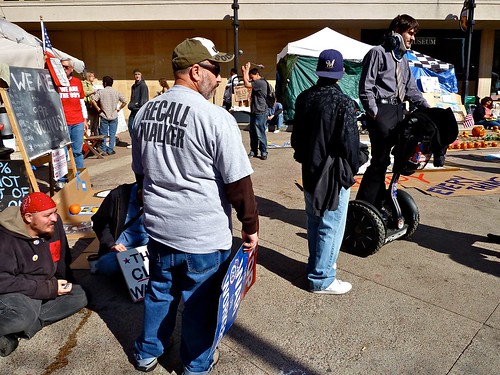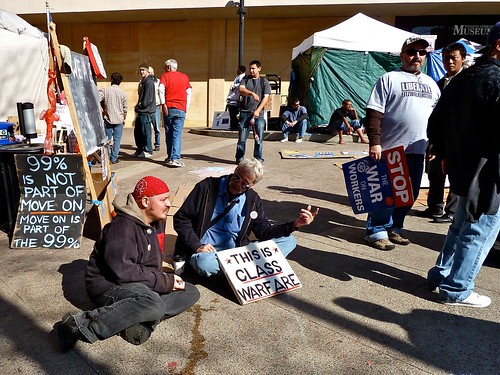In my opinion, and
I was quite critical of Cain after the last debate.
Here's the transcript and video. I'll add a few comments to this post soon.
ADDED: I thought David Gregory really lost his cool early on, as he was questioning Cain about 9-9-9. If you watch the video, you can see he's agitated and grimacing in a way that really lacks the usual polished journalist quality. To excerpt the transcript bits that hint of this attitude:
The reality of the plan is that some people pay more, some people pay less.... You're saying [prices] actually go down?... This isn't about behavior, Mr. Cain, this is about whether you pay--if you don't pay taxes now, and you now have income tax and a sales tax, you pay more in taxes.... Mr. Cain, we talked to independent analysts ourselves.... We're not just reading newspaper clips here... They tell us, they've looked at this, based on what's available of the plan, and it's incontrovertible.
Gregory's experts are incontrovertible? What kind of a question is that? How does Cain deal with this barrage of disbelief from Gregory? He stands his ground and explains his program:
Some people will pay more, but most people would pay less is my argument.... Who will pay more? The people who spend more money on new goods. The sales tax only applies to people who buy new goods, not used goods....
This discussion got me thinking about the positive side of switching to sales tax. With a progressive income tax, the political process sets different percentages for different income levels, so, for example, the majority can vote jack up the taxes on other people — "the rich" — and those other people can work on extracting various exemptions and credits and so forth in an elaborate, inscrutable government system. With a sales tax, you control what you pay through your shopping decisions. Every time you forgo a purchase or buy used goods — and isn't that good for the environment? — you pay no tax. And every time you choose smaller amounts or cheaper goods, you pay less tax. Now, you have various needs that you have to meet, but you have far more control, and you aren't at the mercy of the ever-ongoing machinations of the political process.
My point is: After the debate last week, I was thinking about the negative aspects of the sales tax, but as he was talking about it on "Meet the Press" today, I felt open-minded about the potential benefits. And that was while Gregory was going for the jugular.
MORE: Gregory asked about the Occupy Wall Street movement: "Do you empathize, as the president does, with the message of those Wall Street protesters?" Gregory invites him to express empathy, a concept
Obama has actively promoted (which Gregory prompts us to recall). Cain homes in on the premise that there is a message and proceeds right to criticism of Obama:
What is their message? That's what's unclear. If that message is, "Let's punish the rich," I don't empathize with that message. They should be protesting the White House. The White House has basically enacted failed economic policies. The White House and the Democrats have spent $1 trillion that did not work. Now the president wants to pass another $450 billion. They have their frustrations directed at the wrong group. That's what I'm saying.
Nice clarity and brevity and excellent sharp perception of the opportunity in the question asked.
AND: Gregory confronted him with an extreme statement he made back in February: "The objective of the liberals is to destroy this country" and followed up with a pointed "You think liberals actually seek to do that, that that's their mission, to destroy the economy?"
Cain stood his ground: "It is their mission. Because they do not believe in a stronger America, in my opinion. Yes."
Gregory let it go at that and moved on to another one of Cain's presumably insufficiently thoughtful statements: "You've also said that stupid people are ruining America.... Who exactly are you talking about?"
MR. CAIN: People who are uninformed. People who will not look at an alternate idea. People who are so dug in with partisanship and partisan politics. Open-mindedness is what's going to save this country. The reason that my message is appealing is because it's simple and people can understand it. You know, a good idea transcends party politics...
Somehow, the next question on Gregory's list was: "Is race a factor in this campaign?" Obviously, Cain's answer is going to be
no. I'm more interested in why Gregory jumped from "stupid people" to race. Gregory next displays the new Newsweek cover, which calls Cain "the Anti-Obama," and starts to put together a question: "You've actually talked a bit about race, though, and you've created a contrast between yourself and your experience as an African-American, a term you don't like, by the way."
So suddenly the topic is the terminology of race: African-American or black American, which Cain prefers. Gregory asks why. Cain says:
Because my roots go back through slavery in this country. Yes, they came from Africa, but the roots of my heritage are in the United States of America. So I consider myself a black American.
That's a very rich statement. Slavery is a
heritage. But Gregory goes for the implicit distinction between Cain and Obama: "So you draw some distinction between yourself and your experiences as a black man in America and the experience of President Obama."
Cain says:
Absolutely. I came from very humble beginnings. My mother was a maid, my father was a barber and janitor and a chauffeur. We, we had to, we had to learn--do things the old-fashioned way. We had to work for it. I--my parents never saw themselves as a victim, so I didn't learn how to be a victim. I didn't have anything given to me. I had to work very hard in order to be able to go to school and work my way through school....
Notice how simply and vividly he struck a chord — the classic black American experience — and made it resonate for anyone who works for living. There is a quality of
nobility, that fits with the idea of
heritage. Gregory is at a complete loss, I think, to do anything with this:
MR. GREGORY: You actually said President Obama's outside the mainstream. So you're making a different, more of a social cultural background distinction between you and the president.
MR. CAIN: More experiential. Look at his experiences vs. my experiences. It was more at a contrast of experiential differences than anything else.
MR. GREGORY: Let's talk about foreign policy...
YET MORE: I liked the way, when asked to name his model for the ideal Supreme Court justice, he focused on Clarence Thomas:
I believe that Justice Clarence Thomas, despite all of the attacks that he gets from the left, he basically rules and makes his decisions, in my opinion, based upon the Constitution and solid legal thinking. Justice Clarence Thomas is one of my models.
MR. GREGORY: Has he been targeted unfairly, you think?
MR. CAIN: I think he has been targeted unfairly.
Gregory declines to follow up about what the unfairness was. He moves on to the topic of Cain's wife Gloria, who's been invisible so far. He gave a lovely explanation:
My wife and I, we have a family life, and she is maintaining the calmness and the tranquility of that family life so, when I do get a day off of the campaign trail, I can go home and enjoy my family.
She's his wife, not America's wife. Home is a refuge. That's a good traditionalist message.











